Have you ever made it to the end of an article online and seen “From Around Web” or “Recommended Content?” Usually the headlines are incredibly shocking, and the images eye-catching. Often they’re just plain weird.
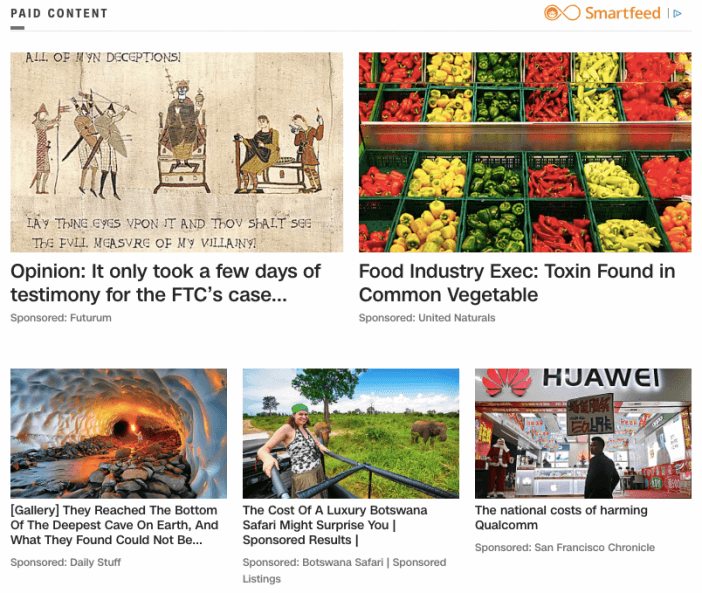
Those are probably OutBrain ads, or Taboola ads – OutBrain’s main competitor*. Technically though, they aren’t ads. They can’t be ads. OutBrain is a “content discovery platform” that specializes in putting paid links where readers are looking for something else to read.
*There was nearly a Taboola OutBrain merger in 2020. The combined company would have been a huge native advertising platform, but the deal fell apart. Either way, they are both still competitors.
OutBrain and Taboola ads are underused by advertisers because they are new, a bit odd, and hard to do well. They are neither ads nor the result of PR…so they don’t really fit into a typical online marketing model.
But they are cheap and give you normally expensive access to premium online publishers, and they appear exactly when readers are looking for something else to click on.
Back in 2014, when OutBrain was just getting started, I ran a few experiments, which I share below. In revisiting the platform, I had hoped that it would have matured over the course of 6 years, but it’s still basically the same. I’ll include screenshots & data from my most recent campaign.
Here’s a guide to OutBrain Ads, how they work, along with a few examples.
What is OutBrain?
OutBrain calls itself a “content discovery platform” and provides the same sort of service to different audiences. Publishers can use OutBrain to outsource their related posts functionality and make money off readers who want to keep reading something.
OutBrain allows a publisher to run widgets with content recommendation and native ad placements. The publisher gets more pageviews and more ad revenue than display ads. They allow an advertiser to reach a target audience with the same granularity as a Facebook ad, but with the same reach as Google Display Ads.
In other words, OutBrain helps publishers make more money no matter if people stay (and read related posts & see more ads) or click and leave (in which case the publisher makes money from the click to leave).
Advertisers can use OutBrain to get cheap access to premium publishers and that have a huge premium audiences, but also premium ad rates. Advertisers can advertise on CNN.com for more than $5 to $10+ per thousand impressions (ie, not clicks) or they can advertise on OutBrain for less than $0.35 per click…with a catch. Here’s how OutBrain describes their services:
Grow your audience by distributing your content on other sites, where people are looking for something new to discover. The audience coming from Outbrain is already in content consumption mode, therefore more engaged and more likely to stay longer.
The catch though is that your advertisement can’t be an advertisement. It has to be content – or at least appear to be content.
The lines here get quite blurry for both publishers and advertisers, and OutBrain is quite lenient on the form of content as long as your landing page isn’t a straight up ad + offer.
Either way, the key takeaway is that OutBrain is like an online advertising network for content. You get cheap incredible reach as long as you play by the rules. The rules are odd, so it’s useful to see who exactly is spending advertising dollars on OutBrain, and what is currently working.
Who Uses OutBrain Ads?
Most OutBrain ads are an ad rate arbitrage play. Advertisers (who are publishers themselves) pay $0.XX for a click via a native ad on OutBrain’s ad network, and then monetize that visit on their own site with premium ads that pay out $0.YY.
For example, a health site might promote content on a general-purpose site for $0.15 per click because once that visitor lands on their site, they can promote a high dollar pharmaceutical ad.
In a very common medical ad on CNN, someone would click the link to “Foods That Could Cause An Irregular Heartbeat” – and they land on this:
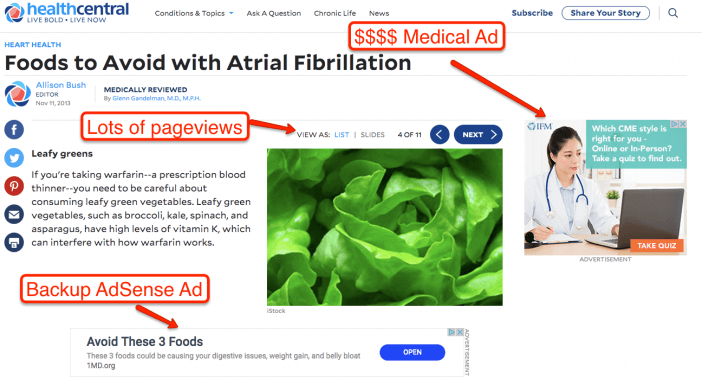
Or they could click on another OutBrain ad and land on a page just stuffed full of low-quality ads.
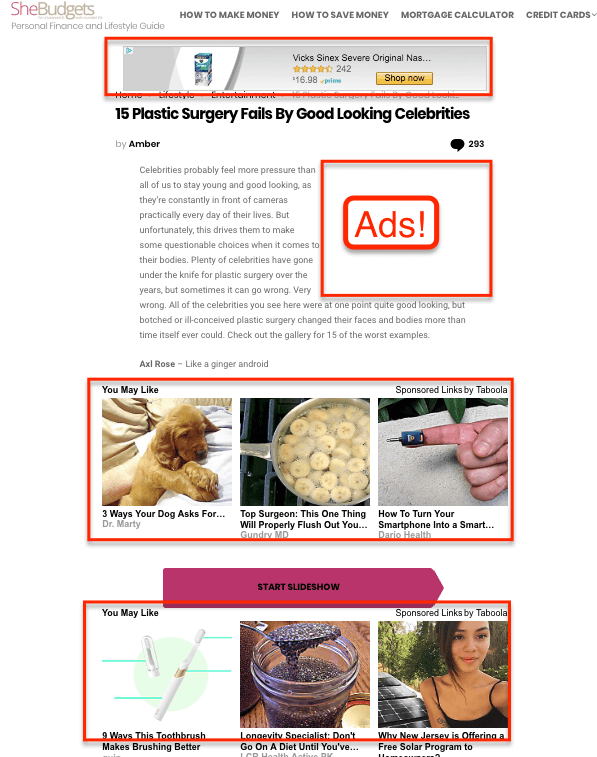
As long as the arbitrage makes sense, the publishers keep at it. Publishers with OutBrain ads get paid for clicks leaving their site, and advertisers get to monetize the visitors with premium ads after that. This strategy is OutBrain’s bread and butter.
To me, the very existence of this strategy indicates a big opportunity. Arbitrage means the market isn’t working, and something is under-priced according to its value.
In other words, not enough businesses are taking advantage of OutBrain. It should not be that cheap relative to display & CPC ads. And there are some companies taking notice.
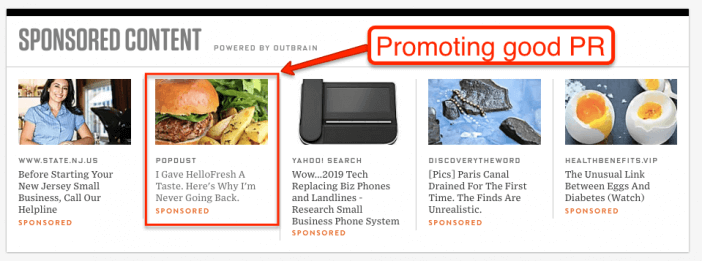
HelloFresh is a brand with high customer acquisition costs, but also high lifetime customer value.
What do you think has a better ROI – paying $10+ CPM for a banner ad that tells people they can get a coupon for HelloFresh…or a piece of positive free PR that tells how the author’s experience really surpassed expectations for $0.20 per click?
I’d love to see their Analytics, but I’d bet on OutBrain. People end up reading valuable content from a trusted journalist or from the company’s actual website. It might not be an ad…but the content basically lives on a big ad for HelloFresh (think promoting sponsored content).
Either way, I’d argue it’s worth a test at least. You can get visits to your site using the content you own for a rock-bottom ad price.
How To Advertise On OutBrain
First, head over to OutBrain. You’ll be signing up for an account to acquire traffic – err… “Amplify Your Content.”
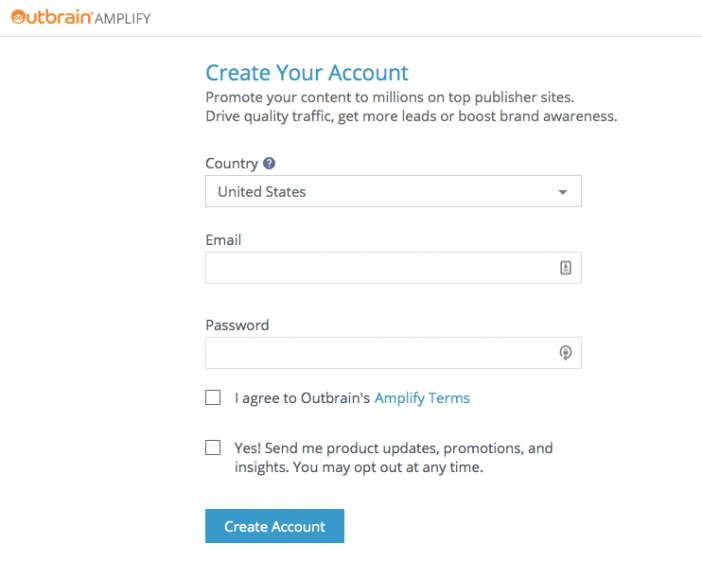
Second, you’ll need to set up the basic settings for your campaign including bid, placements, and tracking.
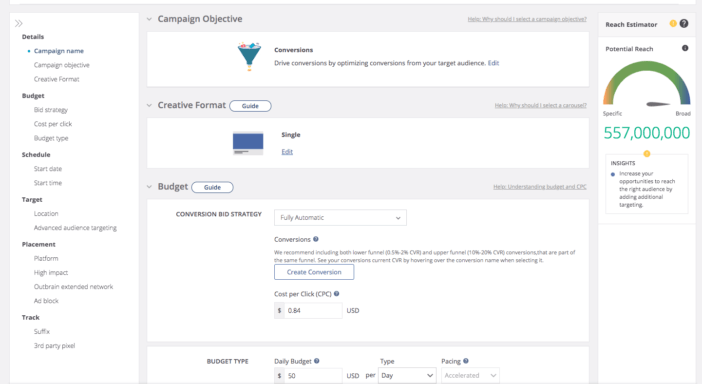
Now – be sure to spend some time setting your location, placements, and devices. The setup is very similar to Google Display and Facebook Ads. The secret is to layer your options rather than betting on a single setting to do it all.
Set up different campaigns based on different campaign settings.
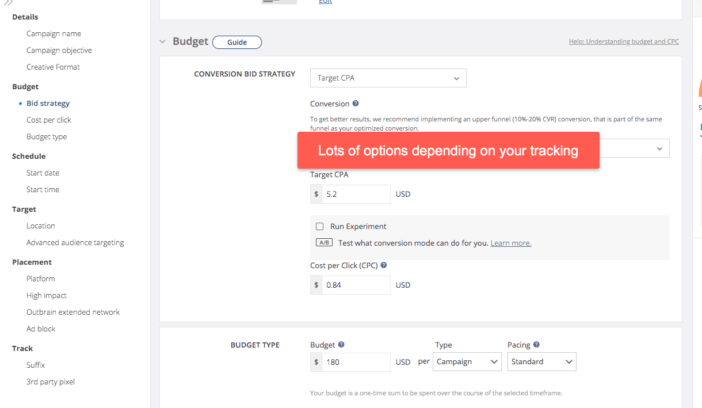
Additionally, make sure you have adequate UTM codes to track as much data as you can. And make sure that you have a solid bid to get traffic & test – your first bid will never be correct. Focus on getting qualified traffic that you can optimize.
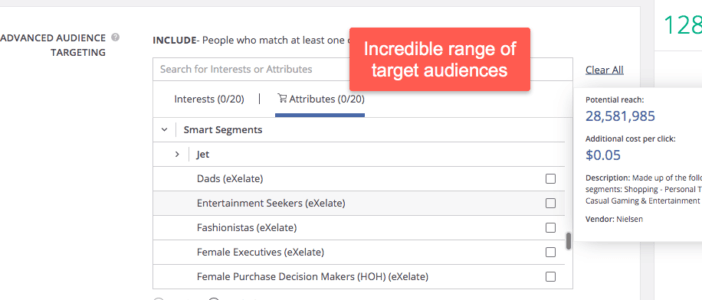
Next, you’ll need to add content to promote. Remember that you have to follow OutBrain guidelines. These have to be content – not landing pages.
However, a smart marketer knows that the line here is pretty blurry. Even if you are trying to drive leads or sales, you need to use a piece of informational content.
However, one improvement that OutBrain has made is that you can now bulk upload content and use their software to automatically test different versions of content.
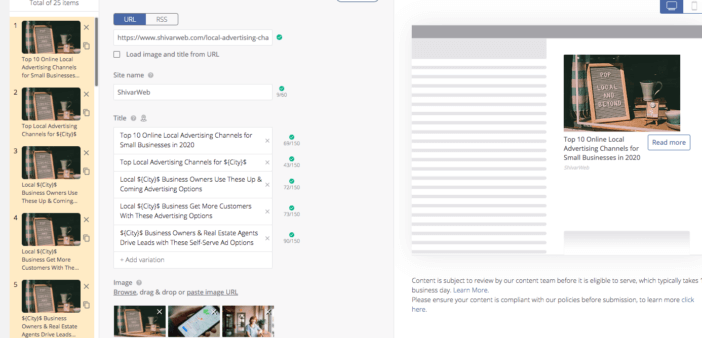
Once you’ve imported your content, you can edit the different thumbnails and headlines. The best advertisers that I’ve known all have one thing in common – they test an incredible number of variations. Don’t leave a headline or image up to intuition. Leave it up to chance – you will have a runaway winner, but you need to create a ton of ads to find that runaway winner.
I used Stencil to create a bunch of 1200×800 images to download and bulk test. I also wrote about my Stencil process here BTW.
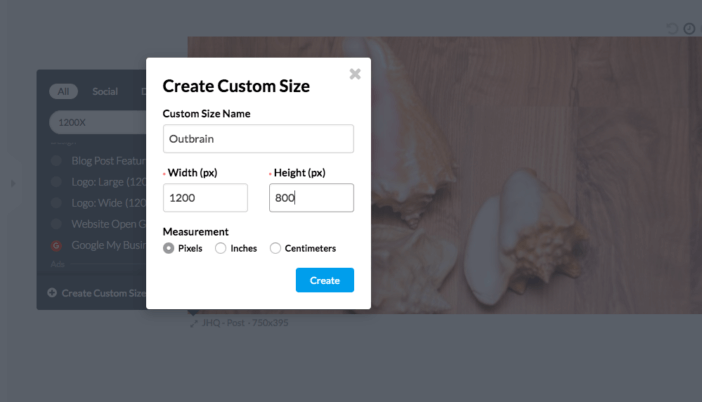
Unlike traditional banner ads, remember the context of where people will see it. You’ll be in direct competition with plenty of other pieces of content, so you’ll need to stand out and evoke curiosity.
On the flip side, you’ll also need to be aware of your own goals – do you want raw traffic or leads or sales?
Your content will go for review after you launch. After that, the steps are similar to any other paid ad campaign. Track your data and improve it.
Ideas For Successfully Using OutBrain
OutBrain is a great way to get cheap traffic to your content. But traffic that doesn’t build your business doesn’t matter. If you’re a publishing-based business, you may be able to make a play on paid ad rate arbitrage, but otherwise, here are 5 ways to use OutBrain advertising to build your business.
1. Go for Social Media Shares & Brand Awareness
Going viral is rarely luck. There’s always something that gets the snowball rolling. Whether it’s a Reddit submission, an email to an editor, or a previously built social audience, viral content starts somewhere.
Using some sort of paid “accelerant” can be a great way to try to engineer organic social shares. That’s the whole point of promoted Facebook posts and promoted tweets.
OutBrain is a cheap, and worthwhile way to generate organic social shares. Unlike promoted tweets, etc – an OutBrain native ad doesn’t look like an ad. They are content that visitors “discover.”
The key, though, is to make sure your content is easily shared. Make sure your Twitter cards are in place; fix your Facebook markup; ensure that the right share buttons are at the right place on the post.
Measure the audience you can reach with the money you spend on OutBrain. Even if your content doesn’t go viral, you can often get a really efficient overall CPM with relatively few social shares generated by the initial OutBrain campaign. This post can help you dig into the numbers for the social share strategy.
2. Get Opt-ins with a bribe
The OutBrain audience is looking for content to read. They are not looking to buy (not to mention OutBrain’s ban on advertising), and they are probably going to bounce.
But that doesn’t mean that they wouldn’t be interested in more information. Try to get email signups at best or Facebook likes/Twitter follows at worst so that you can market to them later when they may be interested in buying.
They are on your site because they like your content (or at least your headline). Offer something complementary to the content just to get their information. Measure OutBrain traffic based on whatever it would normally cost to get a sign-up conversion.
This strategy is going to be the closest to direct response as you’ll get with OutBrain. But if you can successfully get emails with your content, OutBrain will be one of the cheapest ways to drive traffic to your content.
3. Build a retargeting audience
This strategy is the paid version of getting opt-ins. It’s a strategy that you should have in place, even if you don’t actually use retargeting ads. The last thing you want when purchasing OutBrain traffic is to have a huge rush of traffic to your site which then leaves, and completely forgets about you with no way to remind them about who you are.
Google Analytics allows you to fairly easily build audiences based on landing page. You can build these audiences to do retargeting ads later (ie, “the ads that follow you around”) just in case or in addition to other strategies.
Retargeting is generally cheaper and more effective than almost all other forms of paid advertising since you’re advertising to people who have already visited your site.
The key is to build a campaign that’s very targeted and not annoying for your OutBrain audience. It might be new content or a complementary product/service offer, but it won’t be effective if it’s just a general campaign.
You can measure OutBrain with multi-channel Analytics (ie, what conversions did it eventually assist with). Or you can measure the OutBrain + retargeting against the price of buying targeted CPC or CPM ad. It’s sort of like paying $0.25 vinegar + $0.50 baking soda to unclog your kitchen sink instead of the $3.00 mini bottle of Drano.
4. User-testing for your content
If you’re spending a lot of time and money on premium content (or even doing an offline print run), you’ll want to know how to edit it before launch. Since OutBrain is so cheap, it can be a good place to test headlines and responses to your content – sort like a soft launch with user testing for content.
Run multiple small campaigns with different headlines to look at the click-through rate. Install a scroll depth plugin or adjust your bounce rate in Google Analytics so that you can get a clear picture of how users interact with the content.
Measure this OutBrain strategy based on the improvements and time saved with your budget.
5. Use OutBrain CPA Bidding for Direct Response
There are a lot of marketers using OutBrain for direct response successfully. OutBrain has an amazing bid engine with a CPA option. I highly encourage installing OutBrain tracking via Google Tag Manager. It’s tedious, but powerful.
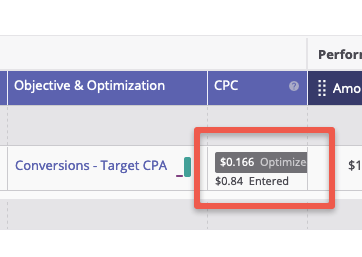
With a large enough budget, OutBrain will optimize placements & audiences based on your landing page performance.
Next Steps
Build content on your site that’s actually interesting. Define what you want to get out of OutBrain. Social shares? Email sign-ups? Branding? Decide how that content will achieve the goal – do you have a bribe for email sign-ups? Would the content make social sharers look good sharing it?
Head over to OutBrain.com, set up an account, define test budget, submit content for approval, watch Analytics closely after the content goes live. Analyze the data and decide what to do from there.
Read my post on how to advertise your website online for other ideas!




Hey Larry,
Thanks for spelling this stuff out. I figured they were running a display network arbitrage model and am glad to see you confirm my idea that adding remarketing to a campaign could build a list on the cheap pretty well.
Now to punch out more content to start leveraging there.